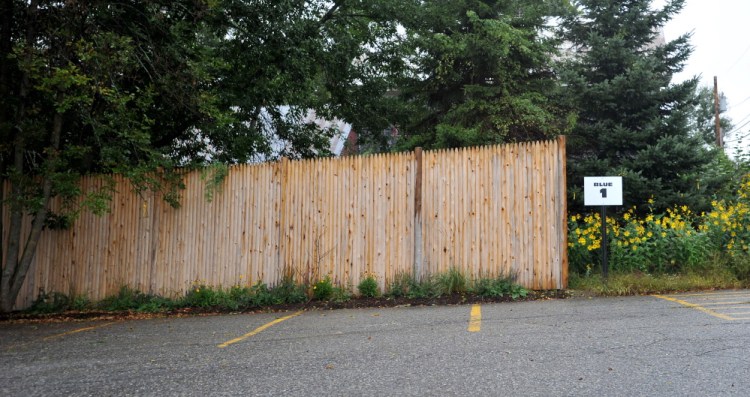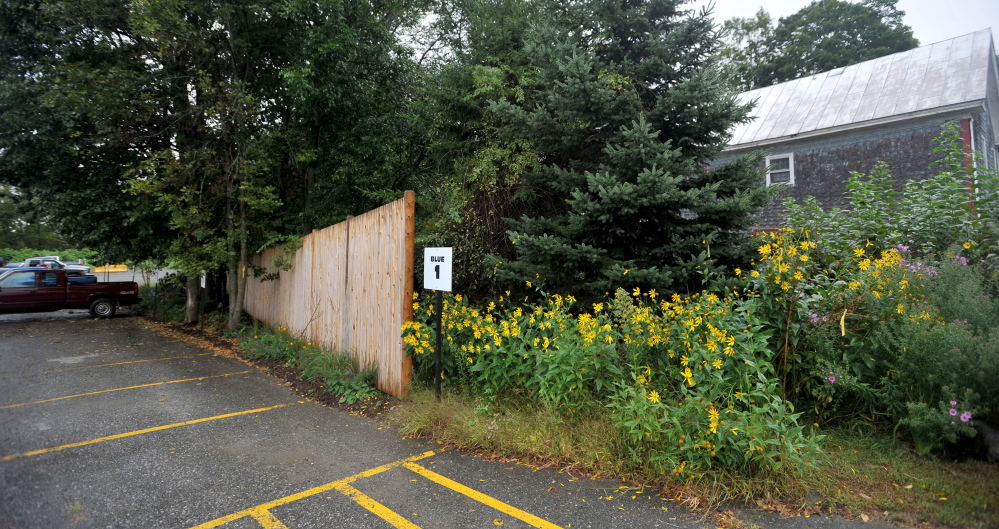NORRIDGEWOCK — A Depot Street couple is suing athletic shoe manufacturer New Balance about the construction of a fence separating their property from the New Balance factory, saying the company is discriminating against them because of a large dog kennel they run out on their property.
“We’re asking them to uphold and obey Maine state laws, and they’re countersuing us, saying our dogs are offensive to them,” said John Ames. “They’re saying we don’t take care of the dogs, all kinds of accusations.”
Ames and his wife, Lisa, are suing New Balance, which operates a 393-employee factory on Depot Street, alleging that the company unfairly seized a 9-foot-long strip of property on the western border of their property without their consent for the construction of a boundary fence in May. The couple and the shoe manufacturer have been in a boundary dispute since May, and although both sides have had the land professionally surveyed, they say the results of the surveys differ and continue to disagree on the placement of the fence.
New Balance, in turn, has countersued in Somerset County Superior Court, claiming that the Ameses have created a nuisance and have prevented the company from being able to “enjoy” its property, which is a legal term meaning the right to use and benefit from the property.
“For several years (the Ameses) have used their property in a manner that has created a nuisance as characterized by the presence of dozens of unattended dogs, chained in place, incessant noise, noxious odors and the presence of multiple vehicles, many in very poor condition and disrepair,” the lawsuit says.
“They were pretty crazy about putting up that fence,” John Ames said. “They wouldn’t stop for any reason, and I think part of their argument is that now that the fence is up, no one is going to hold them accountable.”
Bernard Kubetz, a Bangor attorney representing New Balance, said the company put the fence up because the company was expanding its parking lot and there were “issues regarding Mr. and Mrs. Ames’ yard.”
“The dogs made quite a racket. When people were in the New Balance parking lot, the dogs would become agitated and bark,” he said. “New Balance decided it would be appropriate to put a fence at the end of its parking lot.”
He said the company had not intended to take legal action against the Ameses before the first lawsuit was filed.
According to town records, the Ameses have 49 dogs on their property, which is a little more than one-third of an acre in size.
Their kennel is licensed and the Ameses aren’t violating town ordinances by having the dogs, according to the town manager and the local animal control officer, although in the past they have been cited for violations of the town’s junkyard ordinance and there have been complaints about the dogs. There is no noise ordinance in Norridgewock.
“Sadly, it is legal in many cities for people to have a large number or even small number of animals on chains or in pens,” said Stephanie Bell, cruelty case work director for the Cruelty Investigations Department of People for the Ethical Treatment of Animals, or PETA, an animal rights group.
“Not only is the barking a nuisance, but from an animal welfare standpoint, it’s like these animals are prisoners,” Bell said. “Dogs are meant to be inside with their families, not forgotten at the end of a chain in the backyard. They are highly social animals who crave and desire affection and social stimulation. How could anybody provide 49 animals with that adequately?”
In May, John Ames found a letter from New Balance saying the company had plans to put a fence along the border of the two properties, according to the lawsuit. Ames responded by saying he did not agree with where the boundary was and wanted the land surveyed.
However, Ames said, New Balance then dismantled a stone wall Ames had built in 1987 without his consent and cut down several trees, including some that had been decorated with yellow ribbons hung in honor of the Ameses’ son, an Army soldier in Afghanistan. New Balance built a 9-foot-tall fence in mid-May. The Ameses say that according to Maine law, their presence on the property for more than 20 years entitles them to ownership.
They continue to dispute the placement of the fence, saying that a professional survey they had done about a week after the fence was built differs from the survey that New Balance used.
In the lawsuit, the Ameses ask that New Balance reduce the height of the fence from 9 to 6 feet and that they be compensated for damages caused to their property and legal fees associated with the hasty construction of the fence.
Rachel Ohm — 612-2368
Send questions/comments to the editors.





Success. Please wait for the page to reload. If the page does not reload within 5 seconds, please refresh the page.
Enter your email and password to access comments.
Hi, to comment on stories you must . This profile is in addition to your subscription and website login.
Already have a commenting profile? .
Invalid username/password.
Please check your email to confirm and complete your registration.
Only subscribers are eligible to post comments. Please subscribe or login first for digital access. Here’s why.
Use the form below to reset your password. When you've submitted your account email, we will send an email with a reset code.